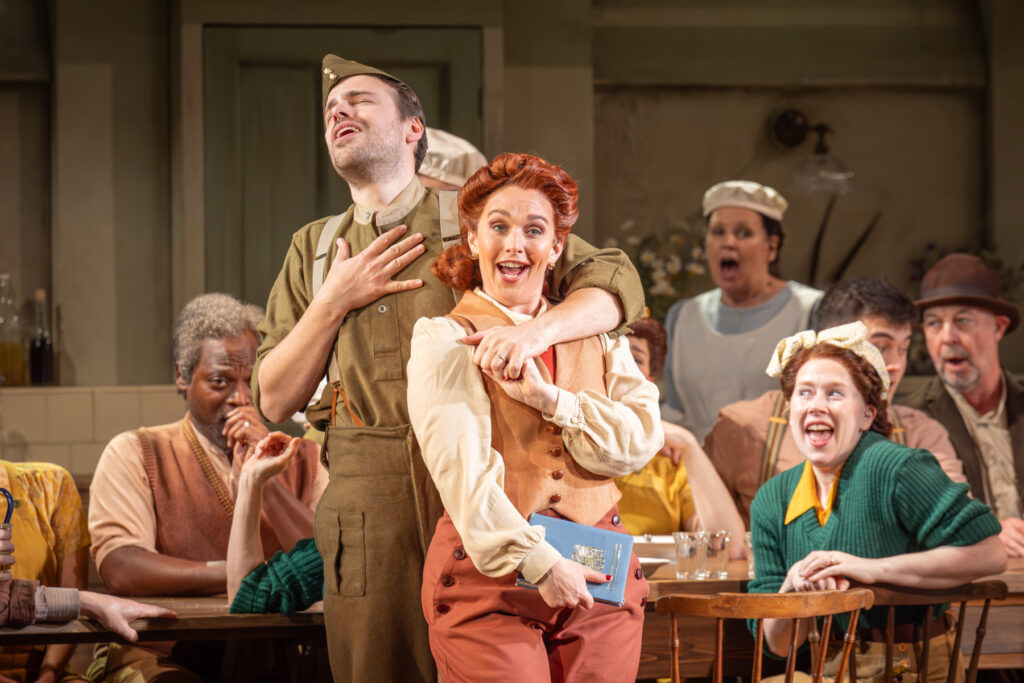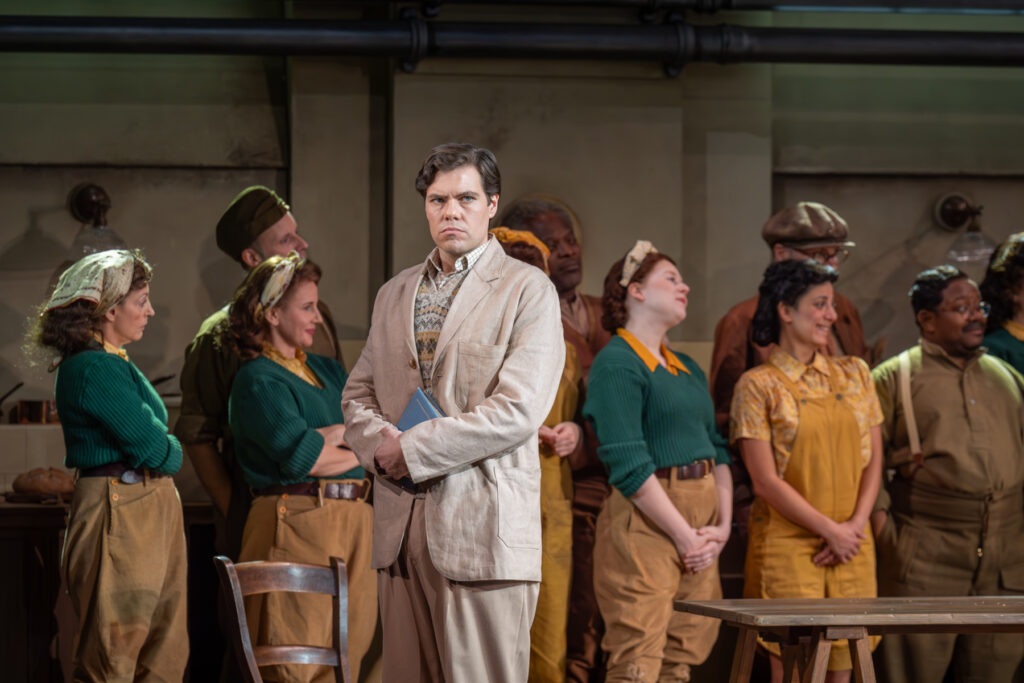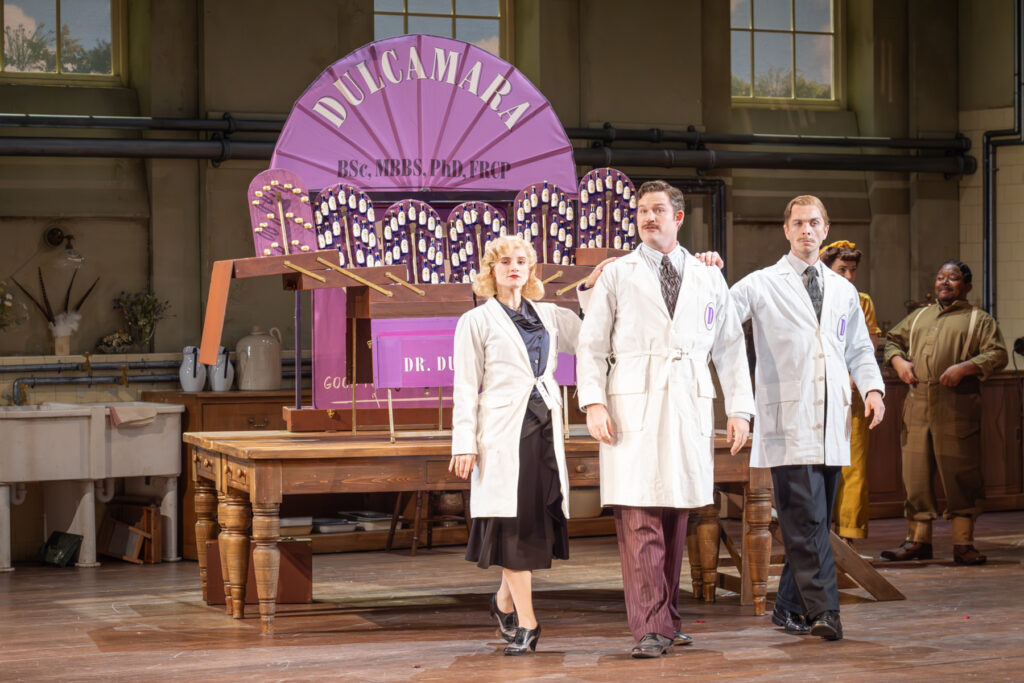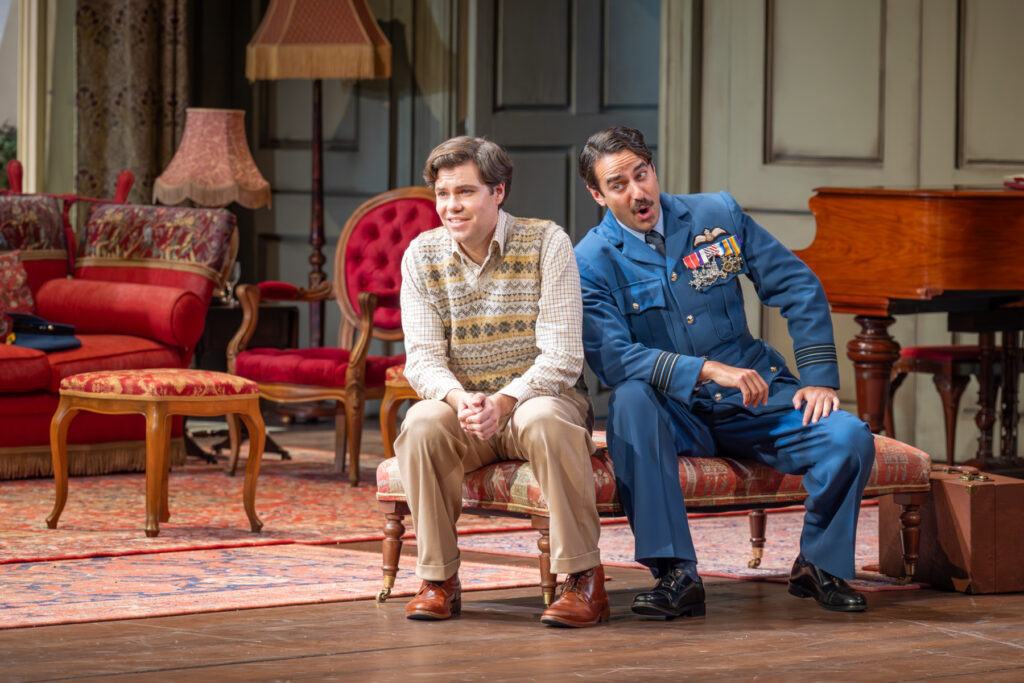OK, so here’s the deal. I can sell you a love potion which will make the object of your desire fall head over heels in love with you. Guaranteed. You can trust me. Deal or no deal? Now picture the poor Nemorino (= a little nobody), from humble origins, desperate to secure the apple of his eye, the rich Adina, to be his betrothed. This encounter with the con artist Dulcamara (= sweet and sour) therefore proves transformational. In essence, this is the storyline of Gaetano Donizetti’s The Elixir of Love (L’elisir d’amore).

A little bit of updating is the challenge that all directors thrive on. In 2024 this would surely translate into something focused on the internet, no doubt with a spot of catfishing. In this new English National Opera production, the director Harry Fehr hasn’t travelled quite so far down the timeline. He sets this melodramma giocoso in the middle of World War II, with Adina’s country mansion now requisitioned by the Women’s Land Army and providing canteen facilities for them and the local RAF Bomber Command. So far, so good. However, he also inserts an additional frame, visible at the start of both acts, to suggest that we are in fact watching a comedy series during the early years of colour television, made specially for ENO TV, complete with a revolving globe similar to the one that used to adorn BBC transmissions. This has no further reference, which makes the exercise rather pointless. Equally puzzling is the director’s idea that Nemorino is a conscientious objector, not picked up in the dialogue or in any other way.
Nicky Shaw’s sets create appropriate atmosphere. The first act takes place in the basement kitchens, with old-fashioned fuse-boxes clearly visible, and tables and chairs that are moved around rather fussily to eschew stasis. The second switches to a fairly opulent ballroom, chesterfield, ottoman and grand piano in attendance. Yet details in this production frequently grate. There are two centrally placed zinc buckets, for the convenience of Nemorino when the excess consumption of love potion and alcohol causes his stomach to revolt. How many country mansions in wartime Britain took account of such eventualities? And then there are the large quantities of expensive-looking champagne that are quaffed, especially by the Women’s Land Army, during the pre-nuptial festivities in the middle of wartime – really?

Some of the costumes look entirely authentic for the period. Dulcamara’s burgundy-coloured, double-breasted suit with wide lapels and baggy trousers, together with the white lab coats he and his two assistants don at one point, as well as the air force blue of the airmen’s uniforms all ring true. But Nemorino is essentially a country bumpkin, and here he is decked out in a cream linen suit and polished brown shoes, looking more like a lounge lizard. There is sometimes an excess of activity on stage. Considering that the workers have been toiling in the fields of the estate before their repast indoors, I’m amazed they are still so full of beans. Working on the land, then as now, is inevitably draining.
These are essentially minor quibbles because what matters is the quality of the singing and the orchestral support it receives. Rhian Lois as Adina has one of those even-toned, buttery voices that you immediately warm to. She has a full and creamy top with a secure chest register. Her florid runs are negotiated with agility and assurance, for example when she recounts to Dulcamara her many previous suitors (“The elixir’s in my eyes”). No wonder Nemorino finds her so lovely and beguiling.

He in turn is warmly sung by Thomas Atkins. He will soon be singing the part of Lensky in Dresden, and there was a lot of that character’s lyrical ardour in his presentation of Nemorino. He has a noble repertory of ringing top notes, not least when towards the end of the first act he implores Adina not to proceed with her hasty decision to marry Belcore. Audiences have to wait long for the most famous of this opera’s arias, “Una furtiva lagrima”, sung as the work draws to a close, at which point Nemorino increasingly senses the strength of Adina’s feeling for him (“She loves me, I know it”). Atkins delivers the aria with an exquisite cantabile line and excellent range of dynamics, stretched out on a sofa for the most part, skilfully communicating the full range of his emotions. One of the characteristics of bel canto is that the voices are not always supported by the orchestra, yet given the quality of the singing, and the evenly matched voices here, the ingenuity of the rapid exchanges in the final duet between Adina and Nemorino is laid fully manifest.
Dan D’Souza’s Belcore exudes vitality and virility, enhanced by the impressive chest medals on his RAF uniform, a wing commander to the core. There is a dark and smoky richness to his baritone which strengthens his appeal to Adina and carries weight in his dismissal of Nemorino (“this insolent hyena”). He repeatedly seizes his chances to taunt and torment his rival. His “Surrender to your conqueror, you’ll do so if you’re smart”, addressed to Adina, duly emphasises his conceitedness.

Brandon Cedel sings the role of Dulcamara with all the confidence of travelling salesmen, certain in his conviction that he can dupe not just the one, but the many, in search of cures for their various physical and mental ailments. There is a particular resonance to his powerful and rounded bass. Like all charlatans, he oozes charm in spades. Not the least of his attractions is his ability to do a perfect cartwheel, demonstrating that he is a man of many parts.
Ensemble pieces abound in this opera, with much for the chorus to do. “Be happy and sing” is what they do when the vicar arrives to officiate, but even more engaging is the reaction of the Land Army when Giannetta reveals that Nemorino’s uncle has just died, leaving a fortune to his nephew. The ladies descend upon Nemorino like a swarm of bees, using all the flirtatious powers in their armoury.
The success of this opera depends not only on good pacing but attention to instrumental details, like the characterful bassoon solo that introduces Nemorino’s famous aria. Teresa Riveiro Böhm brings out a great deal of the sparkle that is inherent in the score with rhythms that are consistently well-sprung. I was particularly struck by the way she managed to make some passages sound like the rum-ti-tum of early Verdi.
Amanda Holden’s translation is uniformly clear and suitably direct. The comic element is often reinforced through the power of rhyme, for instance when Giannetta and the ladies of the Land Army sing, “Now Nemorino won’t need to labour, we’ll have a millionaire as a neighbour”.
Ultimately, this opera is not so much a tale of how unsuspecting and vulnerable victims can quickly succumb to the nefarious tricks played on them by an unscrupulous quack. It is about the value of constancy and the capacity for true love to endure. That is a hopeful sign to be embraced.
Alexander Hall
The Elixir of Love (L’elisir d’amore)
Opera in two acts with a libretto by Felice Romani
Music by Gaetano Donizetti
Sung in English with English surtitles
Cast and production staff:
Adina – Rhian Lois; Nemorino – Thomas Atkins; Dulcamara – Brandon Cedel; Belcore – Dan D’Souza; Giannetta – Segomotso Shupinyaneng; Belcore’s fellow officers – Reece Causton & Suleiman Suleiman; Dulcamara’s assistants – Reece Causton & Bridget Lappin; Vicar – Suleiman Suleiman
Director – Harry Fehr; Set designer – Nicky Shaw; Costume designer – Zahra Mansouri; Lighting designer – Mark Jonathan; Video designer – Matt Powell; Movement director – Anjali Mehra; Translator – Amanda Holden; Chorus director – Matthew Quinn; Chorus and Orchestra of English National Opera; Conductor – Teresa Riveiro Böhm
London Coliseum, 23 November 2024
Top image: Rhian Lois (Adina), Segomotso Shupinyaneng (Giannetta) and Chorus
All photos © Marc Brenner
Further performances until 5 December